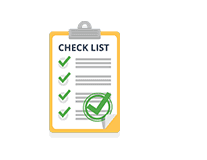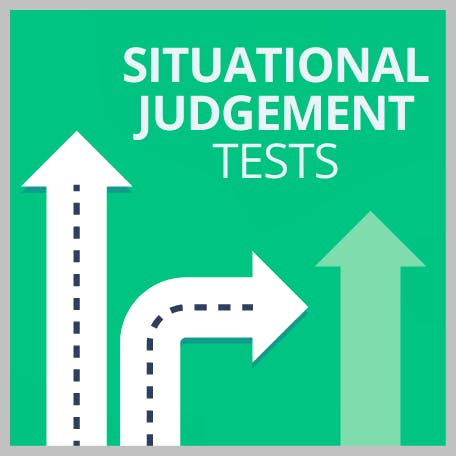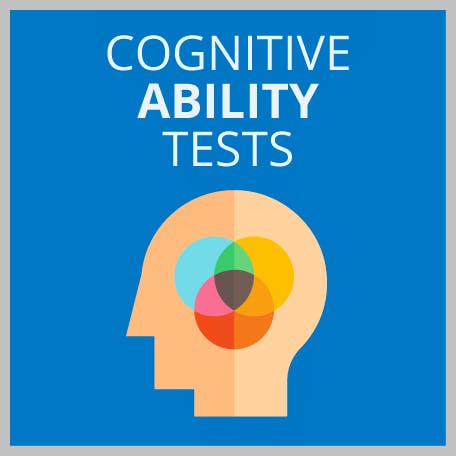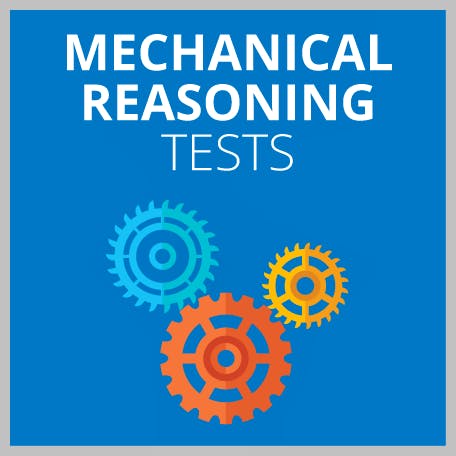Situational Judgement Tests: A Complete Guide (With Practice Questions)
Updated November 26, 2024
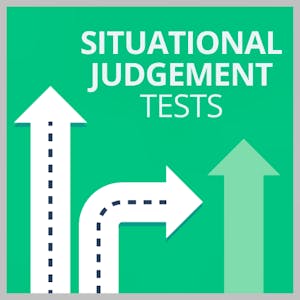
- What Is a Situational Judgment Test?
- Situational Judgement Competencies
- How to Answer SJT Questions
- Why Are Situational Judgement Tests Used?
- Situational Judgement Test Practice Questions
empty
empty
empty
empty
empty
- How to Prepare for a Situational Judgement Test
- How Are Situational Judgement Tests Scored
- Frequently Asked Questions
- Final Thoughts

What Is a Situational Judgment Test?
A situational judgement test (SJT) is a psychometric test that is often used as part of the recruitment process for graduate and managerial positions as well as roles that are customer-facing in a wide range of industries.
The SJT is designed to assess how a candidate deals with work-related problems and situations, focusing on essential aptitudes, competencies and soft skills that are not always easy to evaluate in other ways.
Although SJTs are usually bespoke to the company (or in some cases, the specific role), they tend to follow the same basic structure.
Each question is formed by presenting a fictional yet realistic work-based scenario. This might be text-based, it may include some illustrations or it could be animated or acted out in a video.
Following the scenario, there will be several options that you can choose from, each giving a possible course of action to follow to solve the issue that is presented in the situation given.
The answer that you choose will be compared to the benchmark answers that the recruitment team is using – these represent the core competencies for the role, as well as alignment with company values.
Situational Judgement Competencies
The competencies that the SJT can measure will depend entirely on what the recruitment team feels is necessary for success in the role, but the following are some of the most often used:
- Communication
- Organisation and planning
- Service ethos
- Teamwork
- Leadership, especially negotiating and influencing
- Dealing with challenging situations
- Decision-making and problem-solving
- Relationship building and people skills
- Customer focus
How to Answer SJT Questions
Different test publishers will have different criteria for answering the questions on a situational judgement test, and it might also vary between companies and even between roles.
For example, criteria for answering a police situational judgement test will differ from criteria for civil service judgement test answers.
The SJT is the type of test that is most likely to be bespoke; the situational judgement questions will be designed to allow candidates to demonstrate that they align with the values and ethos of the company, as well as have the necessary soft skills and competencies for future success.
There are three main ways that SJTs should be answered.
- Choose the most appropriate course of action – This is simply choosing the action that you would take that would solve the problem in the most effective way.
- Choose the best and worst course of action – You are looking for extremes here – what would solve the problem, and what wouldn’t.
- Rate/Rank the possible courses of action – This is about making several decisions about how effective each course of action is in comparison to each other as well as for solving the problem.
The multiple-choice options can be confusing; there might be an answer that is quite obviously the worst, but the rest of the options might seem equally good – which is why this type of test is an excellent way of assessing your judgement skills and the way you use information to make good decisions.
It also shows the way you prefer to communicate, and your potential in things like leadership.
Why Are Situational Judgement Tests Used?
Psychometric testing is used in recruitment because it has been scientifically proven that good performance on these types of tests has a strong correlation with good performance at work.
The situational judgement test is used by employers not only because of this correlation but because of the specific competencies that are highlighted.
Using the results of the SJT, a recruitment team will be able to see which candidates have the necessary cognitive abilities, social intelligence, personality traits and work behaviours to be successful.
Recruiters will also be able to see which candidates have demonstrated alignment with the ethos and values of the business as well as any specific job-related knowledge and skills.
Another consideration for recruitment teams is that the SJT is a cost-effective and efficient way to filter through large candidate pools, which is especially useful in graduate and entry-level recruitment where the volume of applicants can be large, and the criteria used for the paper sift cannot be too specific.
Each candidate who has the right qualifications and experience is given the same test to complete, so the results can be considered fair, unbiased and reliable indicators of who is likely to be successful in the future.
Situational Judgement Test Practice Questions
Below you will find a selection of SJT example questions, along with explanations of situational judgement test answers.
Your organisation has implemented a new performance management system that explicitly links your performance to your pay. Your progression up the pay scale now relies on you proving that you have achieved particular levels of performance.
Please state which of these potential courses of action is most and least appropriate.
| Most Appropriate | Least Appropriate | |
|---|---|---|
| Complain to your peers that the new system is unfair but make sure you participate fully in your performance reviews. | ||
| Seek out a copy of the performance framework and use this to critically evaluate your performance and development areas, and then use this information to create a personal development plan. | ||
| Make a note of everything you do which you think might demonstrate your performance. | ||
| Spend your performance reviews complaining to your manager that the new system is unfair, and refuse to participate in any discussions relating to it. |
You are running late for an important meeting where you will be presenting your team’s proposal for a new software system to the board members responsible for allocating the funding.
| Very Appropriate | Slightly Appropriate | Slightly Inappropriate | Very Inappropriate | |
|---|---|---|---|---|
| Drive quicker and hope you manage to make it in time. | ||||
| Call ahead and warn the meeting participants you are running late. | ||||
| Arrange for someone else from your team to step in and lead the proposal until you can get there. | ||||
| Pretend you have a family emergency and ask to re-schedule the meeting. | ||||
| Call the meeting Chair and ask whether there is any chance of rearranging the agenda. |
You answer the phone to an irate customer who claims that she has been overcharged. Although you have checked her account and cannot find any problems, she remains convinced there has been a mistake and is becoming increasingly angry.
Please rank these potential actions in order of appropriateness with 1 being most appropriate and 4 being least appropriate.
| RANK | |
|---|---|
| Hang up on the customer; you’ve done your best and it is inappropriate for her to behave in that way. | |
| Transfer her call to another department and let them try to solve it. | |
| Explain the situation to your manager and ask them what they think you should do. | |
| Take down all of the details of the problem and tell the customer you will fully investigate the problem and get back to her with a response. Fully investigate the issue and then call her back. |
You are working on an important presentation for a meeting that is due to take place on Monday. One of your colleagues has made a mistake which means that most of the data you have used to build the presentation is incorrect, and you only realise last thing on Friday.
Choose the best course of action to solve this problem.
a) Complain to your manager that your colleague has ruined the presentation
b) Do the work and the corrections yourself even if it means working through the weekend
c) Get together with your colleague to edit the incorrect information
d) Present it anyway and hope that nobody notices
While at work, you overhear a colleague on the phone to what you believe to be a customer, and the colleague is obviously getting irate about a problem. You know that this colleague is under performance review for their anger issues, and they appear to be shouting at the customer.
Choose the least effective way of solving this issue.
a) Report the issue directly to the line manager
b) Ignore the problem because it has nothing to do with you
c) Take the colleague aside and ask them if they need help
d) Take over the call and deal with the problem yourself
If you need to prepare for a number of different employment tests and want to outsmart the competition, choose a Premium Membership from JobTestPrep.
You will get access to three PrepPacks of your choice, from a database that covers all the major test providers and employers and tailored profession packs.

How to Prepare for a Situational Judgement Test
Step 1. Research the Recruiter
The more you know about the company that you have applied for – and the role itself – the better prepared you will be to demonstrate that you have the right competencies, traits and behaviours as well as the required alignment with the company values and ethos.
You can get a good idea of what type of person the company is looking for in the details of the job description, where personal skills and aptitudes will be listed.
You can find out a lot more about the wider company goals and values elsewhere on its website, especially in the career sections.
Step 2. Learn to Read the Question
As demonstrated in the sample questions above, the situational judgement test needs certain responses to be given – and the only way you can do that properly is to read the question properly.
Not only do you need to have a good understanding of the scenario you are presented with, but you also need to know whether you must find the best or worst course of action, or rate them depending on their effectiveness.
Rushing could make you miss something important.
Step 3. Take a SJT Practice Test
While the SJT is all about your competencies and inherent behaviours, you can improve your performance by taking a SJT practice test.
Scenario-based questions do not need any previous job-related knowledge, so you are making the decision about how to solve the problem purely based on the type of person that you are at work.
By practicing the test, using different full-length tests like the ones at JobTestPrep, you will be able to see how the questions are phrased, and how you are supposed to answer them – so the test won’t feel so unfamiliar.
Step 4. Ensure All Equipment Is Working
You are likely to be sent a link to complete the situational judgement test online and at home – so you want to make sure that you have access to equipment that works.
In general, it is better to take the test on a PC or a laptop, connected to the internet reliably, and with the latest browsers installed.
Connection issues can cause you to lose concentration in the test, and in the worst-case scenario it could kick you out of the assessment or send it in uncompleted.
Test equipment before you start and also make sure that you are somewhere that you won’t be disturbed during the actual test.
Step 5. Practice Self-Care
Cognitive ability can be impaired if you are not looking after yourself properly, so you need to make sure that you are practicing self-care as much as you can in the run-up to your pre-employment assessments including the situational judgement test.
Aim for at least six to eight hours of sleep every night, and focus on a healthy, balanced diet with plenty of vegetables and protein, as well as a good amount of water.
Sleep, nutrition and hydration are key to a good performance in tests and when you are at work too.
Step 6. Be Honest
In pre-employment testing, you will need to pass the assessment to move through the recruitment process – which means that you might be considering the possibilities of ‘gaming’ the situational judgement test so that you pass.
This is not a good idea, however.
The SJT is there to assess you for your suitability for the role, so if you are less than honest in your answers you are likely to run into problems if you do get the job.
You might have your heart set on the role, but if you do not have the strengths and personality traits that are needed to be successful the likelihood is that you will end up just being miserable, performing poorly and looking for a new role sooner rather than later.
You will want to bear in mind the type of person that the role is looking for, and aim to demonstrate that you have those traits – when you do, of course. There is no point in presenting yourself as an extrovert perfectly suited for a sales role if you absolutely hate talking to new people, for example.
How Are Situational Judgement Tests Scored
Situational judgement tests can differ from other aptitude or cognitive tests because there is no real ‘right’ or ‘wrong’ answer.
Instead, the situational judgement test answers you give are compared to a benchmark, usually derived from asking the test questions to people already in the role to decide which answers demonstrate the right competencies.
This is also why more than one of the potential courses of action in the multiple-choice answer options might seem like an adequate way to deal with the problem – as the recruiters are looking for someone who deals with challenges in the right way for the business.
Scoring, therefore, is as bespoke as the test itself.
When the recruiter gets your results, they might be presented in several different ways, including:
- Overall score as matched to the benchmark
- Detailed competency scores – Further breakdown of scores on the individual attributes and skills tested
- Comparison scores – These are usually presented as a percentile or scale and show how your performance compares to a ‘norm’ group of other test takers. The norm group is usually relevant to the position – for example, if you are looking at a graduate scheme, your results will be compared to graduate-level test takers. If you score in the 85th percentile, this means that you have performed better than 85% of the norm group.
It is worth remembering that you are being matched to a ‘persona’ created by the recruitment team.
This means that you might not score perfectly across all competencies, but the closer your answers align to what they are looking for, the more likely it will be that you are going to get taken further in the application process.
The situational judgement test is a pre-employment assessment that is used to assess your ability to deal with problems, using different competencies and skills like communication, critical thinking and reasoning.
The test consists of different work-related scenarios that introduce a problem needing to be solved.
The situational judgement test can be hard to pass because you need to match the answers that the recruitment team is looking for – and these are not always obvious.
The best way to pass is to be honest, and get some practice in using resources like JobTestPrep.
Look at situational judgement test examples and try to answer a variety of SJT practice questions to help you prepare. You can find both paid-for and free situational judgement test practice questions online.
You can prepare for the situational judgement test at JobTestPrep, which is a one-stop shop for all things pre-employment assessment related.
At JobTestPrep you’ll find detailed guides about different test publishers, as well as example situational judgement test questions, tips and tricks and full-length practice tests.
The number of questions on a SJT test depends on the publisher and the company that you are applying for, but they tend to be relatively short, untimed tests.
In almost all cases, the situational judgement test does not have a time limit. They usually take about 30 minutes to complete, and you are encouraged to answer with your ‘gut feeling’ rather than trying to think about each answer too much.
The situational judgement test is an assessment of different competencies, such as cognitive ability, decision-making, problem-solving and the way you approach a problem. These are linked with high performance at work.
The score that you need for the SJT test depends entirely on what the company that you have applied for has deemed to be the best answers.
For example, ideal civil service situational judgement test answers will be different from ideal answers for tests in other industries. This means that your best chance for a pass is to be honest and demonstrate that you have the skills the specific company you applied for is looking for.
Recruiters are looking for specific traits and competencies from candidates who complete the situational judgement test, which means that if you do not match closely enough with what they are looking for then your application will not be taken further.
Depending on the company, you may be able to reapply for the role later if you fail the SJT and your application is not taken further. If this is the case, you may get a chance to retake the situational judgement test then.
You can find more situational judgement test practice questions at JobTestPrep, as well as a detailed guide, tips and tactics and full-length practice tests so that you can be as prepared as possible for what is to come.
The SJT can sometimes be administered with other aptitude and psychometric tests, and they usually come into the recruitment process quite early on when they are sent online. You might be taken through to the interview stage after passing, or invited to an assessment centre.
You can find a complete guide for the SJT at JobTestPrep, where there are essential tips, tricks and tactics to help you answer the questions in the best way, as well as SJT example questions with explanations and full-length practice tests.
Final Thoughts
Honesty is the best policy when it comes to completing a situational judgement test, and as they are such a popular pre-employment assessment you need to be confident in your own knowledge and abilities.
Practice makes perfect, and by getting a lot of exposure to different work-related scenarios and the possible courses of action that you could take to solve the problems, you will be able to see where your work behaviour and personality traits will match with what the recruitment team is looking for.
Situational judgement tests are like little work previews for you as a candidate, so you can see some of the scenarios you could face if you were to get the job – and that is why they are effective assessments for both the recruitment team and for you as well.









